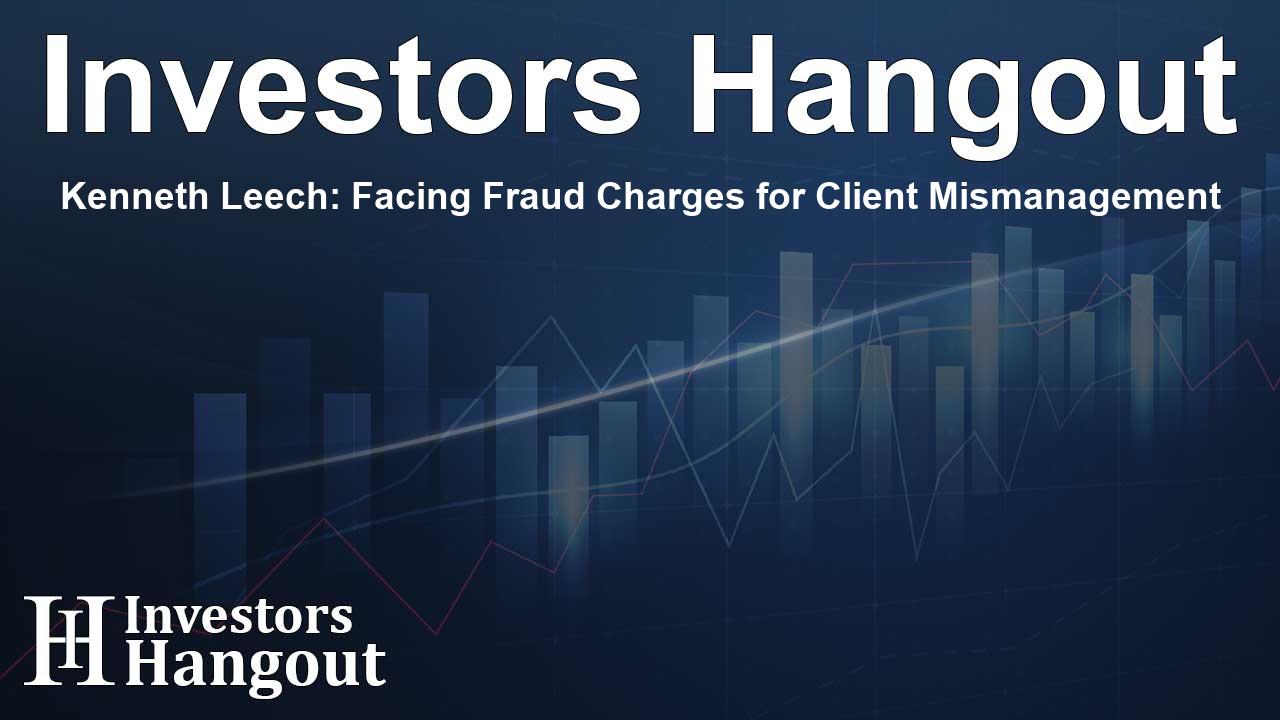Kenneth Leech: Facing Fraud Charges for Client Mismanagement

Overview of Kenneth Leech's Fraud Charges
Kenneth Leech, a veteran in the finance industry and former co-chief investment officer at Western Asset Management Co., now faces alarming legal challenges. Recently charged with running a fraudulent scheme exceeding $600 million, Leech is accused of unethical trading practices where he prioritized certain clients over others. The nature of the offenses is shocking, as it is alleged that Leech operated under a method known as "cherry-picking." This practice involves favoring the accounts of selected clients, leading to unfair advantages in trade allocation.
The Allegations Explained
The charges against Leech originated from an investigation by the U.S. Attorney's office in Manhattan. He faces four counts of fraud along with one count of making false statements. Furthermore, the U.S. Securities and Exchange Commission has filed civil charges against him, emphasizing the gravity of the situation. According to authorities, Leech's actions spanned from January 2021 to October 2023, during which he allegedly manipulated U.S. Treasury derivative trades by steering successful trades toward preferred client accounts while leaving less favorable ones for others. This pattern reportedly undermined the principles of fair trading and transparency that clients expect from investment professionals.
Reactions and Implications
The allegations have led to significant turmoil. Sanjay Wadhwa, the acting director of the SEC enforcement division, expressed his dismay, stating that Leech's actions represented a gross violation of fiduciary duties to clients, who have borne the brunt of his misconduct. On a personal note, Leech's reputation is in jeopardy as he is required to make an initial court appearance soon. Critics have pointed out the distress this has caused among investors who placed their trust in him and Wamco.
Leech's Defense
In response to the legal proceedings, Jonathan Sack, representing Leech, has voiced strong denials regarding the charges. He characterized the accusations as "unfounded" and argued that they overlook critical details regarding fixed-income strategies. Sack insists that the allegations ignore the complexities of trading performance on a first-day basis, asserting that Leech has maintained an admirable career spanning almost five decades, free from previous allegations of malfeasance. Sack emphasized that Leech never personally benefited from the alleged wrongful trading behaviors and is committed to defending his honor throughout the legal process.
Impact on Franklin Resources
Leech's situation significantly impacts Franklin Resources, the parent company of Wamco. While Franklin has not faced charges, the fallout from Leech's alleged actions has forced the company to deal with severe reputational damage. Franklin acquired Wamco as part of its purchase of Legg Mason in 2020. Still, as news of the ongoing investigations spread, investors began pulling substantial funds from Wamco, often resulting in tens of billions of dollars in withdrawals. The firm is now grappling with the implications of these massive outflows, which have only been exacerbated by Franklin's recent $389.2 million impairment charge related to Wamco.
Market Reaction
As the financial landscape continues to evolve in response to these developments, Franklin's stock has taken a hit, plummeting 24% this year alone. This decline highlights the broader market pressures the company faces, especially against the backdrop of overall market performance. The significant financial strain caused by Leech's alleged fraud not only affects Franklin but also impacts the clients who have invested considerable sums trusting the firm.
The Bigger Picture
Ultimately, the unfolding situation surrounding Kenneth Leech serves as a cautionary tale in the world of finance, demonstrating the critical importance of ethical conduct among money managers. As this case develops, it emphasizes the need for stringent oversight in investment firms that handle large amounts of client funds. Investors are reminded of the potential repercussions of unethical practices and the profound impact such cases have on trust in financial institutions.
Frequently Asked Questions
1. What are Kenneth Leech's charges?
Kenneth Leech faces charges of fraud and making false statements related to the manipulation of trade allocations in favor of certain clients.
2. How much is Leech alleged to have mismanaged?
Leech is accused of running a scheme involving more than $600 million in improperly allocated trades.
3. What are the implications for Franklin Resources?
Franklin Resources is facing reputational damage and financial strain as a result of the investigations into Leech's conduct.
4. What defense is being presented for Leech?
Leech's attorney claims the charges are unfounded and argues that Leech acted properly throughout his career.
5. How has the market reacted to this news?
Franklin's stock has dropped significantly this year, reflecting investor concern and tension regarding the ongoing legal issues surrounding Leech.
About Investors Hangout
Investors Hangout is a leading online stock forum for financial discussion and learning, offering a wide range of free tools and resources. It draws in traders of all levels, who exchange market knowledge, investigate trading tactics, and keep an eye on industry developments in real time. Featuring financial articles, stock message boards, quotes, charts, company profiles, and live news updates. Through cooperative learning and a wealth of informational resources, it helps users from novices creating their first portfolios to experts honing their techniques. Join Investors Hangout today: https://investorshangout.com/
Disclaimer: The content of this article is solely for general informational purposes only; it does not represent legal, financial, or investment advice. Investors Hangout does not offer financial advice; the author is not a licensed financial advisor. Consult a qualified advisor before making any financial or investment decisions based on this article. The author's interpretation of publicly available data shapes the opinions presented here; as a result, they should not be taken as advice to purchase, sell, or hold any securities mentioned or any other investments. The author does not guarantee the accuracy, completeness, or timeliness of any material, providing it "as is." Information and market conditions may change; past performance is not indicative of future outcomes. If any of the material offered here is inaccurate, please contact us for corrections.